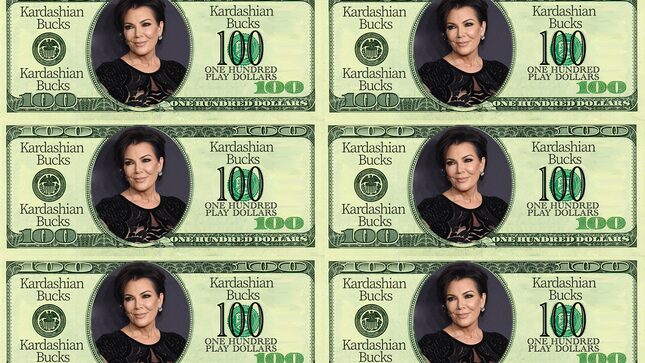On the Kardashian's Internet, the Memes Monetize You
Latest

There’s a common misconception among the young and hopeful—myself included—that building a successful “brand” online will give you the means to survive. It’s clear how many were taught to believe that. Growing up with the internet intrinsically linked to our formative identities, Get Z watched as older millennials turned blogs into book deals, or spun Twitter feeds into web series (and, in rare cases, a late night cable hosting gig.) Instagram was devoured by the influencer economy while I was still in high school, and I honestly don’t remember it being any different. So it’s understandable that so many craft their online presence into a concept that can be packaged and sold. But who really stands to gain from the work?
Chief among such meme merchants is Kylie Jenner. The lip kit baroness recently burst into daughter Stormi’s playroom in her massive, concrete Calabasas mausoleum for Kylie Cosmetics. The idea of a playroom solely devoted to an executive’s child-raising in an office undoubtedly inhabited by other parents aside, the focus of “Welcome to Our Office” marketing package became a small ditty she sang to wake her daughter—“Rise and Shine,” which practically nobody expected to come out of her. Twitter (as expected) went nuts. The meme machine quickly translated it to “RuHISE and ShiNE,” and creators dubbed it over countless video snippets in the extended irony universe.
Such explosions of virality are common amongst the cabal of Kardashians that orbit Calabasas, and much of online culture. Kris Jenner is accused of working harder than the devil for a reason! If you were to recount the 10 most scandalous gossip stories of the decade, at least half of them could easily involve her Klan. And how many times have you scrolled past a meme involving Kim crying, or Kris holding a gun? (Too many!) Virality hasn’t just bolstered the Kardashian’s fame—it’s intrinsic to it.
Shortly after the moment went viral, capitalist bible Forbes published “3 Marketing Lessons From Kylie Jenner’s ‘Rise And Shine’ Viral Moment.” It offered lessons for brands hoping to capitalize on moments like this, based on Kylie Cosmetics’ response to the phenomenon. Within days of the video, they’d released “Rise and Shine” sweatshirts through The Kylie Shop, sent out emails referencing it to promote “brand-new” eyeshadows, and shared a video of Kylie showing her daughter EDM remixes. The lesson, as Forbes posited, was to integrate Twitter memes into your pre-existing marketing channels. But this fundamentally misunderstands how the Kardashians operate. “Rise and Shine” wasn’t a surprising opportunity for the Kylie Cosmetics brand—it was tailored to do exactly what it did.
I doubt that Kris or her daughters would ever admit to manufacturing press and drama to bolster their many brands. But they have been caught in various acts that suggest as much, like staging scenes long after the events they purportedly depict, or consistently fudging the timeline of events to lead viewers through manufactured narratives. There’s also Kimono, Kim’s short-lived shape wear line that was later renamed as Skims. After the internet went nuclear on her terrible appropriation of traditional Japanese garments for spandex underwear, she still went on to sell (allegedly) $2 million in product on the first day of launch. Paired with Kylie’s recently filed trademark for “Rise and Shine,” you can trace the pattern. Easily packaged press angles, rife with meme-able potential, launched into the world with the expectation that revenue will flow back in their direction. From the success of Skims, and the sold out “Rise and Shine” sweatshirts (artificial scarcity aside,) I’d say it’s going exactly as planned.
For these schemes to work, though, it requires an army of internet denizens ready and willing to dub their machinations over pre-existing meme fodder. Thankfully, the internet has assembled such a force who are desperate to escape their non-viral lives, endlessly engaging with content, hoping they’ll evolve into something more: A Brand! It’s a cyclical economy. Corporations, or people who are essentially corporations like the Kardashians, pump out advertising content with a GIF-able angle. Young and aspiring brands, in turn, attempt to capitalize on those viral caches. Products sell, follower counts go up, and hopefully, for someone, the rent gets paid.
I fully understand the irony in this, as someone who makes my living reporting on people and brands exactly like the Kardashians. The media, and the host of blue-checked Twitter celebrities in orbit around publications like this, are fully complicit in the system pioneered by Kris Jenner and her many, many daughters. There’s no direct route to freeing ourselves from brands or the Kardashian’s vice grip on popular imagination—except a revolution! For this, we should look to those who just want a laugh between shifts or classes, or something to look at while commuting home on subways. Fearless internet residents, who tweet for no particular reason. They may be no less safe from the advertising maelstrom overtaking the internet, but they do provide a blueprint for a more socialized internet, predicated on the desire to share memes for the sake of memes themselves.